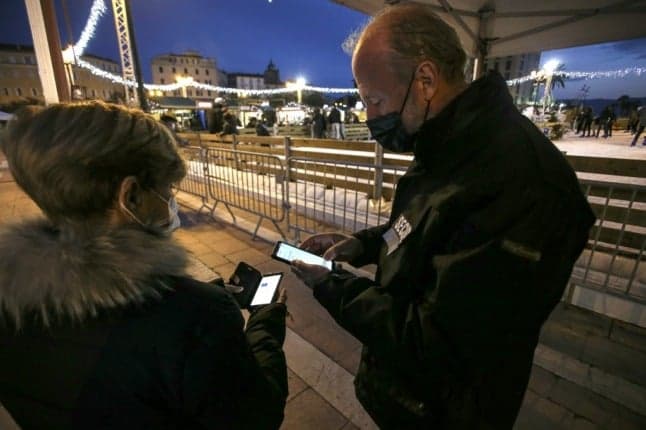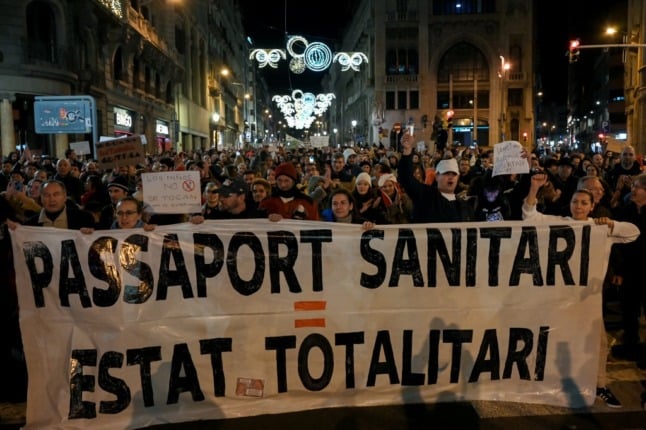Is the Covid health pass helping to reduce infections in Spain?

As the Spanish regions that introduced the requirement of the Covid certificate for daily affairs consider how long to keep the measure for, we look at whether this document has served to lower infections during this sixth coronavirus wave.
After almost two years of pandemic, Covid restrictions and rules have become part of daily life in Spain.
Curfews, mask wearing, capacity limits, hospitality closures - all have been controversial to an extent, but perhaps none more than the Covid-19 health pass for domestic matters.
Thirteen of Spain’s 17 regional governments have received approval from local judges over the last two months to introduce the requirement of this document to access bars, restaurants, cafés, hospitals, care homes, events and more indoor public spaces, a measure the high courts initially rejected for “breaching fundamental rights”.
MAP: Which regions in Spain require a Covid-19 health pass?
But the Covid health pass’s widespread use across Europe and the search for alternative ways to keep infections low and encourage the remaining few unvaccinated to get vaccinated ensured that the EU-wide accepted document made it to Spain.
Has it served to prevent further Covid-19 infections during this sixth coronavirus wave?
The data doesn’t suggest so, and if it has helped to reduce infections, the difference is nowhere near big enough to prevent the record incidence that the Omicron variant has caused.
According to Spanish health ministry data, the 13 regions that had the Covid-19 health pass rule in place in December 2021 saw their infections rise by 45 percent on average, with 1.6 million new cases.
In Navarre, the Basque Country and Aragón, all of which require a Covid certificate from citizens, the fortnightly infection rate is around 6,000 cases per 100,000 people, almost double the national average.
The Spanish regions that did not implement the Covid-19 health pass for daily affairs - Madrid, Castilla-La Mancha, Castilla León and Extremadura - all currently have high infection rates but, with the exception of Castilla y León, are in the bottom half of the table.
In terms of hospitalisations, there is no discernable difference between regions with or without the Covid-19 health pass requirement.
In hospitals in Castilla y León, Madrid, the Basque Country, Navarre, Aragón, Catalonia, the Valencian region and the Balearic Islands hospital bed occupancy by Covid patients is above 25 percent. In Asturias, Cantabria and Castilla-La Mancha it’s between 15 percent and 25 percent. In Extremadura, Murcia and Andalusia it’s below 15 percent and only Galicia are Covid hospitalisations take up fewer than 10 percent of beds.

Opposition to the Covid health pass hasn’t been as big in Spain as in other European countries but protests have been held, such as this one in Barcelona in December where demonstrators hold a banner reading "health passport, totalitarian state". (Photo by LLUIS GENE / AFP)
As for ICU occupancy, Cantabria and Catalonia have the highest rate of ICU admissions due to Covid-19. Both regions require the Covid-19 health pass from citizens for different daily affairs. The rate of patients in ICU has increased across all regions.
And in terms of Covid deaths, there is again no clear difference to be drawn between the regions that require and those that don't require the Covid certificate when looking at the coronavirus deaths per million rate or the 857 Covid deaths confirmed in Spain over the last week.
So it appears that the Covid health pass does little to help against Omicron infections.
Has the health document played a part in at least keeping the unvaccinated away from hospital and serious illness?
Quite possibly - unvaccinated patients continue to make up the majority of serious cases, with Spanish health data showing the Covid-19 vaccine reduces the chance of hospitalisation by 78.6 percent and ending up in ICU by 85.9 percent.
The Covid-19 health pass has probably also served to increase the rate of vaccination in Spain, with now only 6.7 percent of the total population - 828,000 people - unvaccinated against Covid-19.
What the Covid certificate has not clearly achieved is to prevent Covid-19 infections (or reinfections, which have now quintupled in Spain under this variant) during Spain's sixth wave.
READ MORE: Andalusia and Valencia regions extend Covid health pass requirement
The thirteen Spanish regions that implemented the Covid health pass only have a temporary judicial approval to keep the measure in place, so authorities will have to consider soon if it’s worth maintaining in a country where vaccine uptake has been so high among the population.
However, most European countries are sticking by their Covid health pass measures, and in the case of France tightening the rules, with the Covid health pass for daily affairs now only a vaccine pass, thus not allowing a negative Covid test as proof of not being infected.
READ ALSO:
Comments
See Also
After almost two years of pandemic, Covid restrictions and rules have become part of daily life in Spain.
Curfews, mask wearing, capacity limits, hospitality closures - all have been controversial to an extent, but perhaps none more than the Covid-19 health pass for domestic matters.
Thirteen of Spain’s 17 regional governments have received approval from local judges over the last two months to introduce the requirement of this document to access bars, restaurants, cafés, hospitals, care homes, events and more indoor public spaces, a measure the high courts initially rejected for “breaching fundamental rights”.
MAP: Which regions in Spain require a Covid-19 health pass?
But the Covid health pass’s widespread use across Europe and the search for alternative ways to keep infections low and encourage the remaining few unvaccinated to get vaccinated ensured that the EU-wide accepted document made it to Spain.
Has it served to prevent further Covid-19 infections during this sixth coronavirus wave?
The data doesn’t suggest so, and if it has helped to reduce infections, the difference is nowhere near big enough to prevent the record incidence that the Omicron variant has caused.
According to Spanish health ministry data, the 13 regions that had the Covid-19 health pass rule in place in December 2021 saw their infections rise by 45 percent on average, with 1.6 million new cases.
In Navarre, the Basque Country and Aragón, all of which require a Covid certificate from citizens, the fortnightly infection rate is around 6,000 cases per 100,000 people, almost double the national average.
The Spanish regions that did not implement the Covid-19 health pass for daily affairs - Madrid, Castilla-La Mancha, Castilla León and Extremadura - all currently have high infection rates but, with the exception of Castilla y León, are in the bottom half of the table.
In terms of hospitalisations, there is no discernable difference between regions with or without the Covid-19 health pass requirement.
In hospitals in Castilla y León, Madrid, the Basque Country, Navarre, Aragón, Catalonia, the Valencian region and the Balearic Islands hospital bed occupancy by Covid patients is above 25 percent. In Asturias, Cantabria and Castilla-La Mancha it’s between 15 percent and 25 percent. In Extremadura, Murcia and Andalusia it’s below 15 percent and only Galicia are Covid hospitalisations take up fewer than 10 percent of beds.

As for ICU occupancy, Cantabria and Catalonia have the highest rate of ICU admissions due to Covid-19. Both regions require the Covid-19 health pass from citizens for different daily affairs. The rate of patients in ICU has increased across all regions.
And in terms of Covid deaths, there is again no clear difference to be drawn between the regions that require and those that don't require the Covid certificate when looking at the coronavirus deaths per million rate or the 857 Covid deaths confirmed in Spain over the last week.
So it appears that the Covid health pass does little to help against Omicron infections.
Has the health document played a part in at least keeping the unvaccinated away from hospital and serious illness?
Quite possibly - unvaccinated patients continue to make up the majority of serious cases, with Spanish health data showing the Covid-19 vaccine reduces the chance of hospitalisation by 78.6 percent and ending up in ICU by 85.9 percent.
The Covid-19 health pass has probably also served to increase the rate of vaccination in Spain, with now only 6.7 percent of the total population - 828,000 people - unvaccinated against Covid-19.
What the Covid certificate has not clearly achieved is to prevent Covid-19 infections (or reinfections, which have now quintupled in Spain under this variant) during Spain's sixth wave.
READ MORE: Andalusia and Valencia regions extend Covid health pass requirement
The thirteen Spanish regions that implemented the Covid health pass only have a temporary judicial approval to keep the measure in place, so authorities will have to consider soon if it’s worth maintaining in a country where vaccine uptake has been so high among the population.
However, most European countries are sticking by their Covid health pass measures, and in the case of France tightening the rules, with the Covid health pass for daily affairs now only a vaccine pass, thus not allowing a negative Covid test as proof of not being infected.
READ ALSO:
Join the conversation in our comments section below. Share your own views and experience and if you have a question or suggestion for our journalists then email us at [email protected].
Please keep comments civil, constructive and on topic – and make sure to read our terms of use before getting involved.
Please log in here to leave a comment.